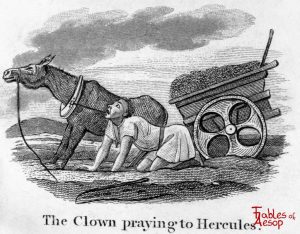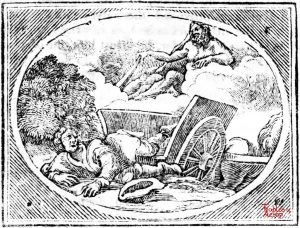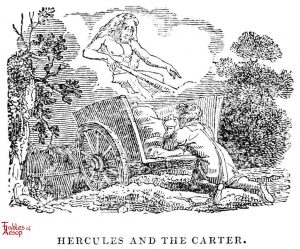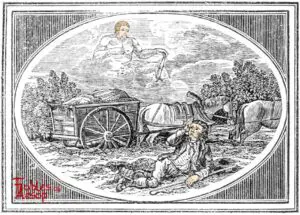A stuck wagoner prays to Hercules for help but receives none.
The gods help those who help themselves.

Eliot/Jacobs Version
A Wagoner was driving a heavy load along a muddy road. He came to a part of the road where the wheels sank half-way into the mire, and the more the horses pulled, the deeper sank the wheels. So the Wagoner threw down his whip, knelt down and prayed to Hercules the Strong.
“O Hercules, help me in this my hour of distress.”
But Hercules appeared to him, and said: “Tut, man, don’t sprawl there. Get up and put your shoulder to the wheel.”

Aesop For Children
A Farmer was driving his wagon along a miry country road after a heavy rain. The horses could hardly drag the load through the deep mud, and at last came to a standstill when one of the wheels sank to the hub in a rut.
The farmer climbed down from his seat and stood beside the wagon looking at it but without making the least effort to get it out of the rut. All he did was to curse his bad luck and call loudly on Hercules to come to his aid. Then, it is said, Hercules really did appear, saying:
“Put your shoulder to the wheel, man, and urge on your horses. Do you think you can move the wagon by simply looking at it and whining about it? Hercules will not help unless you make some effort to help yourself.”
And when the farmer put his shoulder to the wheel and urged on the horses, the wagon moved very readily, and soon the Farmer was riding along in great content and with a good lesson learned.
Moral
Self help is the best help.
Heaven helps those who help themselves.

Jefferys Taylor (The Clown Praying to Hercules)
AN ancient Roman, you must know,
(I think his name was Cicero,)
Wishing to make his garden smarter,
Bespoke some gravel of a carter;
But that had many miles to come,
To reach his seat at Tusculum;
And then, beside all this, the way
Was quite knee-deep in miry clay;
The horse was lame, the cart was crazy,
And, worse than all, the man was lazy.
If so, you’ll say, I am afraid
That Tully’s job will be delay’d.
Exactly so; the cart at length
Was fix’d beyond the horse’s strength:
In vain the driver groan’d and grumbled,
Down in the mud all-fours he tumbled,
And there for near an hour he lay;
Thought he, “to Hercules I’ll pray,
And this, I think, will do to say:
“‘O thou, who wrench’d the lion’s jaws,
Regardless of his teeth and claws;
Who drown’d the Hydra (if I’m right),
And Cerberus didst drag to light;
Who flung the boar, and toss’d the bull
Over thy shoulders, with a pull;
Captured the oxen; Geryon slew,
And Diomedes vanquish’d too;
Who caught the stag that ran so fast,
And shot those birds of prey at last;
Who conquer’d those great Amazons,
And all the stables cleansed at once
(Two thousand of them); and, I’m told,
Procured the apples made of gold.
O Hercules! so strong thou art,
Sure thou canst move this horse and cart.'”
Scarce had he ceased, when rolling thunder
Surprised this man with fear and wonder;
Then straight before his eyes he sees
No less a form than Hercules,
Who soon began in words like these:
“You impious, idle, lazy fellow!
How long will you lie there and bellow?
Disturbing my immortal neighbours,
With that long rig-me-roll of labours!
Think you, I’ll help you with your load,
While you lie sprawling on the road?
Apply your shoulders to the wheel,
Nor idly thus before me kneel;
Then, should the task too mighty prove,
I may assist you with a shove;
But those who indolent remain
May roar for help, but roar in vain.”
This is the moral of the fable,—
To help yourself if you are able.

Townsend version
A carter was driving a wagon along a country lane, when the wheels sank down deep into a rut. The rustic driver, stupefied and aghast, stood looking at the wagon, and did nothing but utter loud cries to Hercules to come and help him. Hercules, it is said, appeared and thus addressed him: “Put your shoulders to the wheels, my man. Goad on your bullocks, and never more pray to me for help, until you have done your best to help yourself, or depend upon it you will henceforth pray in vain.”
Moral
Self-help is the best help.

Samuel Croxall (Hercules and the Carter)
AS a clownish fellow was driving his cart along a deep miry lane, the wheels stuck so fast in the clay, that the horses could not draw them out. Upon this he fell a bawling and praying to Hercules to come and help him. Hercules looking down from a cloud, bid him not lie there, like an idle rascal as he was, but get up and whip his horses stoutly, and clap his shoulder to the wheel; adding, that this was the only way for him to obtain his assistance.
THE APPLICATION
This fable shows us how vain and ill-grounded the expectations of those people are, who imagine they can obtain whatever they want by importuning Heaven with their prayers; for it is so agreeable to the nature of the divine being, to be better pleased with virtuous actions and an honest industry, than idle prayers, that it is a sort of blasphemy to say otherwise. These were the sentiments of honest good heathens, who were strangers to all revealed religion: but it is not strange that they should embrace and propagate such a notion, since it is no other than the dictate of common reason. What is both strange in itself, and surprising how it could be made so fashionable, is, that most of those whose reason should be enlightened by revelation, are very apt to be guilty of this stupidity, and by praying often for the comforts of life, to neglect that business which is the proper means of procuring them. How such a mistaken devotion came to prevail, one cannot imagine, unless from one of these two motives; either that people, by such a veil of hypocrisy, would pass themselves upon mankind for better than they really are; or are influenced by unskilful preachers (which is sometimes, indeed too often, the case) to mind the world as little as possible, even to the neglect of their necessary callings. No question but it is a great sin for a man to fail in his trade or occupation, by running often to prayers; it being a demonstration in itself, though the scripture had never said it, that we please God most, when we are doing the most good: and how can we do more good, than by a sober honest industry, to provide for those of their own household, and to endeavour to have to give to them that needeth. The man who is virtuously and honestly engaged, is actually serving God all the while; and is more likely to have his silent wishes, accompanied with strenuous endeavours, complied with by the Supreme Being, than he who begs with a fruitless vehemence, and solicits with an empty hand: a hand, which would be more religious were it usefully employed, and more devout, were it stretched forth to do good to those that want it.

Thomas Bewick (Hercules and the Carter)
As a clownish Fellow was driving his cart along a deep miry lane, the wheels stuck so fast in the clay, that his horses could not draw it out. Upon this he fell a bawling and praying to Hercules to come and help him. Hercules, looking down from a cloud, bid him not lie there like an idle dastardly looby as he was, but get up and whip his horses, and clap his shoulder stoutly to the wheel, adding that this was the only way for him to obtain assistance.
APPLICATION
The man who sits down at his ease, and prays to Heaven to have all his wants supplied, and his wishes accomplished, by a miracle wrought in his favour, without using his own exertions and honest endeavours to obtain them, deserves to be disappointed. Many men who have a fair share of natural good sense, and who also value themselves upon having their reasoning powers enlightened by revelation, yet fall into this error: led by fanatics and bigots, they follow the fashion of running often to prayers and sermons, when they might be much better employed at home. The industrious good man, instead of publicly praying for the comforts of life, pursues his business, which is the proper means of procuring them; and if at the same time he holds converse with his Maker, which all men ought to do, and no man can be happy without doing, he needs no veil of hypocrisy to make the world believe he is better than he really is: he feels it his duty and pleasure so to proceed, while he sojourns here, and knows not how he can do better, than by sober and honest industry to provide for those of his own household, and to endeavour for the means of helping him that needeth. The man who is virtuously and honestly engaged, is actually serving God all the while; and is more likely to have his silent wishes, accompanied with strenuous endeavours, complied with by the Supreme Being, than he who begs with an unnecessary vehemence, and solicits with an empty hand–a hand which would be more religious, were it usefully employed, and more devout, were it stretched out to do good to those that want it.

JBR Collection
As a Wagoner was driving his wain through a miry lane, the wheels stuck fast in the clay, and the Horses could get on no further. The Man dropped on his knees, and began crying and praying to Hercules with all his might to come and help him. “Lazy fellow!” said Hercules, “get up and stir yourself. Whip your Horses stoutly, and put your shoulder to the wheel. If you want my help then, you shall have it.”

Crane Poetry Visual
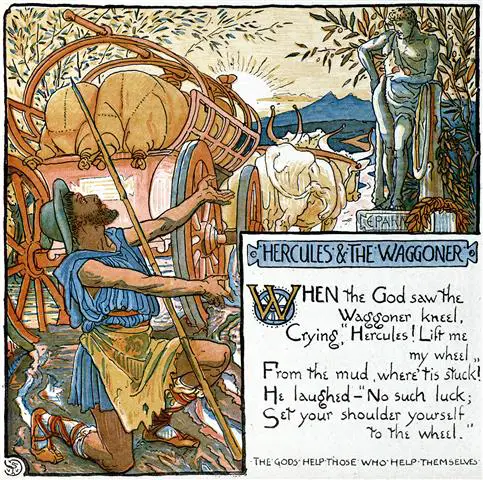
When the God saw the Waggoner kneel,
Crying, “Hercules! Lift me my wheel
From the bun, where ’tis stuck!”
He laughed – “No such luck;
Set your shoulder yourself to the wheel.”
The Gods help those who help themselves.

Hercules et Rusticus
Rustici aratrum haeret in profundo luto. Mox prostratus, Herculem implorat, cum statim vox a caelo auditur: “Inepte, flagellato equos et ipse totis viribus umerisque annitere rotis! Et deinde Herculem invocato! Tunc enim tibi propitius Hercules aderit.”
Moral
Fabula innuit quod otiosa vota nihil prosunt; iuva temet, et ipse te adiuvabit Deus.
Perry #291
